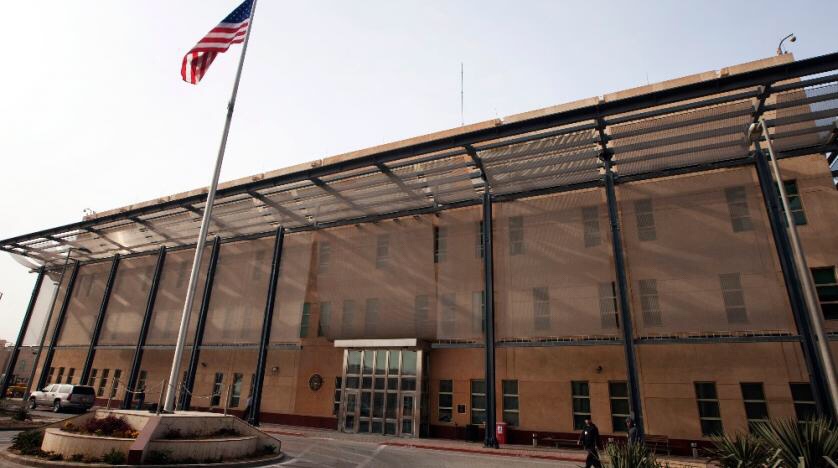Sunday, 28 April, 2019 – 06:00 –
The chancellery building inside the compound of the US …
Baghdad – Fadhel al-Nashmi
Concerns have been growing in Iraq that it will be dragged into the raging conflict between the United States and Iran that has reached new heights after Washington announced Monday that it will no longer issue exemptions to buyers of Iranian oil.
Earlier this month, the United States blacklisted Iran’s Revolutionary Guards and earlier this week the US embassy in Baghdad further stoked tensions when it accused Iran’s supreme leader of Ali Khamenei of corruption.
“Corruption is rife in all parts of the Iranian regime, starting at the top. The possessions of the current supreme leader Ali Khamenei alone are estimated at $200 billion, while many people languish in poverty because of the dire economic situation in Iran after 40 years of rule by the mullahs,” said a post on the embassy’s Facebook page.
Iraqi factions loyal to Tehran were quick to slam the mission for its statement.
Fateh alliance leader Hadi al-Ameri strongly condemned “the use of diplomatic missions in Iraq to harm any country or religious authorities.” He deemed the statement a violation of diplomatic regulations and norms.
He demanded that the embassy immediately delete the “harmful” post and called on the Foreign Ministry to summon the American charge d’affaires and hand him a formal letter of complaint.
Leader of the Asa’ib Ahl al-Haq faction, Qaid al-Khazali deemed the US embassy’s statement as an attempt to stoke strife in Iraq. He denounced the “use of Iraq to meddle in the internal affairs of its neighbors.”
The criticism was not limited to pro-Iran forces, but extended to other figures, reflecting the concerns mounting in Iraq over the escalating conflict between the Washington and Tehran.
Sadrist movement leader, cleric Moqtada al-Sadr expressed his concern over the “interference” in Iraqi affairs by both sides. He also called for shutting the American embassy in Baghdad should Iraq be dragged into the brewing conflict.
Moreover, he called on the pro-Iran Popular Mobilization Forces and other armed groups to withdraw from Syria and return to Iraq. He also demanded that an agreement be signed between Iraq and Iran that calls on each country to respect the sovereignty of the other.
Head of the Reform alliance Ammar al-Hakim warned against exploiting Iraq to launch a “media, trade or political war.” In a brief statement, he underlined Iraq’s “neutrality and non-interference” in regional conflicts out of its keenness on protecting its higher national interest.
Political science professor at the University of Kufa, Eyad al-Anbar, noted that the fiery rhetoric between the US and Iran was becoming even more heated.
“It appears that Iraq is an arena for both sides to deliver their messages,” he told Asharq Al-Awsat.
“Iraq’s problem lies in its inability to distance itself from Iran. At the same time, it cannot give up American support. The Iraqi government has remained silent over the issue and sufficed with statements that reflect the lack of vision to manage the crisis,” he added.
Head of the Iraq Center for Development of Media, Adnan Sarraj, expressed his concerns that the American-Iranian tensions may boil over into a clash on Iraqi territory.
“Despite the hostile rhetoric, however, the American policy does not lean towards a direct clash with Iran because it believes that its harsh sanctions will eventually bring Tehran to its knees,” he told Asharq Al-Awsat.
He said that the US embassy post was primarily a message to Iraq to urge it to counter Iran’s influence in its territory. “This is why the Iraqis responded to the post, not Iran,” he noted.

No comments:
Post a Comment